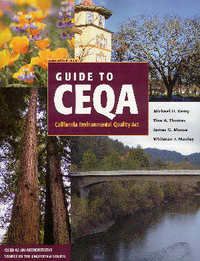CA high court rejects bid to expand CEQA’s scope
 The California Supreme Court has rejected a bold bid by San Francisco regulators to sharply increase the scope of the California Environmental Quality Act, the landmark 1970 law that has helped shape the Golden State’s housing patterns and economy for decades.
The California Supreme Court has rejected a bold bid by San Francisco regulators to sharply increase the scope of the California Environmental Quality Act, the landmark 1970 law that has helped shape the Golden State’s housing patterns and economy for decades.
The Bay Area Air Quality Management District argued that it’s not enough for developers to detail the environmental impacts from their proposed projects. Instead, they must also detail how the existing environment would affect the residents, employees or customers of new housing, commercial-retail or mixed-use projects. That assertion outraged the California Building Industry Association, which said it placed huge new obstacles on projects in urban areas — especially “infill” projects championed by environmentalists as a way to increase housing density near mass transit options.
Builders got their way at the trial court level, but an appellate court sided with the Bay Area AQMD. This month, however, a unanimous state Supreme Court ruled that CEQA simply doesn’t mandate that sweeping a review.
“Given the sometimes costly nature of the analysis required under CEQA when an EIR is required, such an expansion would tend to complicate a variety of residential, commercial, and other projects beyond what a fair reading of the statute would support,” wrote Judge Mariano-Florentino Cuéllar. Instead, he wrote, CEQA deals with “the project’s impact on the environment – and not the environment’s impact on the project.”
Builders feared adverse ruling
The decision came as a huge relief to developers and business interests, many of whom expected an adverse decision in the wake of the California high court’s Nov. 30 ruling that rejected the 5,800-page environmental impact report for the Newhall master planned community in the Santa Clarita Valley. The project, first proposed in the 1980s, would create homes, retail-commercial zones and leisure-recreational facilities for 58,000 people.
Contrary to some reports, this wasn’t just a simple battle between environmentalists — in this case, the Center for Biological Diversity — and a developer — the Newhall Land & Farming Co. The California Department of Fish and Wildlife was the first named party in the lawsuit because it had helped prepare an EIR that said the project had enough mitigation that it would have no net negative effect on the environment, specifically in the release of additional greenhouse gases. The state had been encouraged to take this position by Los Angeles County, which approved the Newhall project’s zoning in 2003.
Justice knocks ‘recipe for paralysis’
The Newhall decision was supported by five of the seven California justices. Interestingly, one of the two dissenters invoked not just his reading of CEQA but the larger issue of a lack of housing in California. This is from the Los Angeles Times:
Justice Ming W. Chin said the environmental impact report could be fairly easily revised but complained the litigation would delay the project by years at a time when the state faces a housing shortage.
“Delay the project long enough and it has to meet new targets, and then perhaps new targets after that,” Chin wrote. “All this is a recipe for paralysis.”
This acknowledgment of the effects of judicial decisions on the real world is relatively unusual. For example, in May, the Illinois Supreme Court threw out a state pension reform program that supporters said was crucial to keeping Illinois from becoming the first state to declare bankruptcy. This account is from The New York Times:
All seven members of the state’s highest court found that a pension overhaul lawmakers had agreed to almost a year and a half ago violated the Illinois Constitution. The changes would have curtailed future cost-of-living adjustments for workers, raised the age of retirement for some and put a cap on pensions for those with the highest salaries. But under the state Constitution, benefits promised as part of a pension system for public workers “shall not be diminished or impaired.”
“Crisis is not an excuse to abandon the rule of law,” Justice Lloyd A. Karmeier wrote in an opinion. “It is a summons to defend it.”
Whether or not the federal government might come to the rescue of Illinois if it went bankrupt has been the topic of intense speculation in that state’s media.
Chris Reed
Chris Reed is a regular contributor to Cal Watchdog. Reed is an editorial writer for U-T San Diego. Before joining the U-T in July 2005, he was the opinion-page columns editor and wrote the featured weekly Unspin column for The Orange County Register. Reed was on the national board of the Association of Opinion Page Editors from 2003-2005. From 2000 to 2005, Reed made more than 100 appearances as a featured news analyst on Los Angeles-area National Public Radio affiliate KPCC-FM. From 1990 to 1998, Reed was an editor, metro columnist and film critic at the Inland Valley Daily Bulletin in Ontario. Reed has a political science degree from the University of Hawaii (Hilo campus), where he edited the student newspaper, the Vulcan News, his senior year. He is on Twitter: @chrisreed99.
Related Articles
Bill to limit effect of GOP tax overhaul on governor’s desk
Gov. Jerry Brown will have to decide soon on whether to once again put California in direct conflict with the
Democratic candidates for California governor reveal positions on single-payer health care and education
The 2018 governor’s race got off to an informal start last week with candidate forums in Anaheim and San Francisco. Former
Hollingsworth's sensible pension reform
Sen. Dennis Hollingsworth, R-Murrieta, is introducing tomorrow important pension reform legislation, SB919. I’ve given it a quick perusal and this




